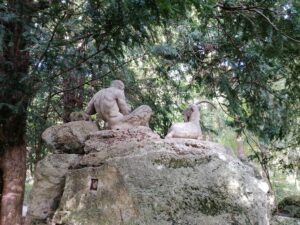
Pan arrangement in Nymphenburg Palace Park, München, Germany. Courtesy Lilia Gaivan, Creative Commons Attribution-Share Alike 4.0 International
I am handy at finding right words for right places, often by intuition and sometimes by a dim sense of the rags of poetry in them. When a word comes to mind that seems odd for the context, I look at its archaic meanings before I discard it in case it can convey more than mere accuracy.
I did not have a father, growing up, and my mother made me wary of men in general. Yesterday was Father’s Day, and I have been wondering if “terror” is too strong a word for what I felt as a kid encountering other kids’ fathers. Oxford University Press says, “In Early Modern English, terror comes to stand for a state of fear provoked on the very edge of the social. That state is associated with the god Pan and the fear that grips men when they feel themselves removed from any social contact. It also stands for death itself.”
This might describe the anxieties of a boy in a defunct town deep in the Midwest, looking outward at the world, where his absent father was rumored to be at that moment having whatever adventures—Khyber Pass, Pacific island, Beirut—men had when unpinned from maps of the known world.
It would be inaccurate, however, to pin interior wildness, an appreciation of the natural world, and lack of social intercourse on the masculine in my family, further complicating things in my mind. My mother was the [Peter] Pan in those regards. And neither of my parents was ever ruttish in their affairs, as far as I know, which they saw as undignified and in bad taste.
But it is true that men in the time and place of my childhood were often somewhere else, while the women were always present and in fact had no place else to go even if they allowed themselves dreams of flight. The fathers of my friends disappeared daily, down in the mines, over to the office or shop, into the cab of trucks whose wheels moved within wheels, like Ezekiel’s chariot. Some fathers left for longer periods for war, business, teaching the unwashed.
Most of them came back but had been changed and were often weary, sometimes dirty, short-tempered, hungry, smelling of sweat, smoke, strange perfume. They sat down to dinner and ate in silence; disappeared into dens like lone wolves; sat on lawn chairs in the front yard listening to faraway games on transistor radios, or on church pews, fingering their beads; hung themselves with extension cords in their own father’s garages.
These men were as two-dimensional to me as Waldo: If I saw them at all, I saw their departing backs and returning fronts. Women, on the other hand, mothers especially, I saw all day, from every angle. Mothers were the carers, nurturers, and feeders of my town but were not unfull of their own mysteries, indicated only by pointed sighs, silent angers, vague complaints, and gossip with each other. What mothers and fathers provided, I learned, was as complicated as their abandonments.
In the end, I have tried as a father myself to fashion the best of both modeled worlds. If I have made homes comfortable, cooked, done domestic chores, and served all roles in raising and supporting sons, I have also headed out to have a look around and brought back my own answers, which I try to communicate.
But there is a point in all children’s lives at which they grow heart-sick of their parents’ fashions, which after all will never save them from needing to find their own ways. Do not be angry, we might tell them. We all must settle our own definitions and live the consequences. I love you just the same.
As for the fathers who have carried, listened, focused their attention, and supported emotionally: prepare for being pushed to the edges; even my best wishes are a day late.
